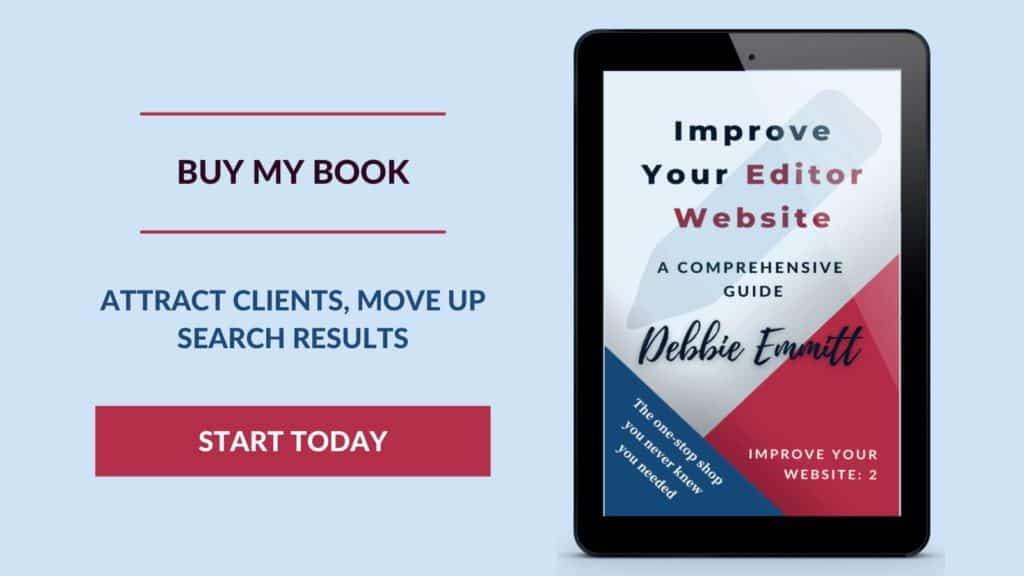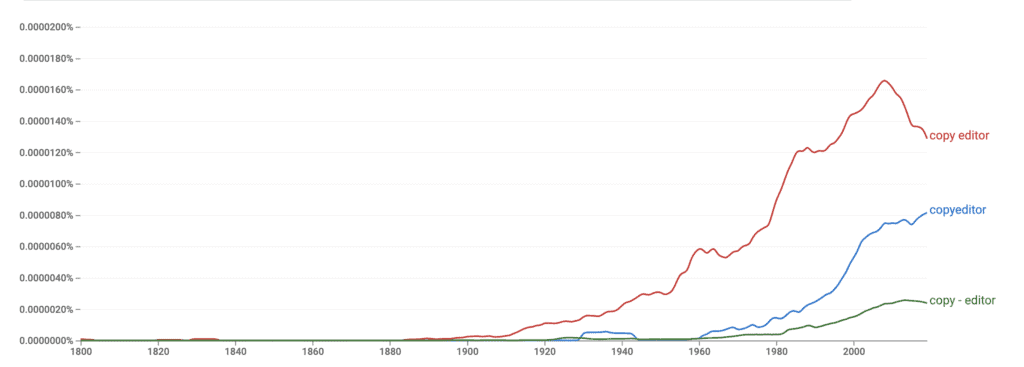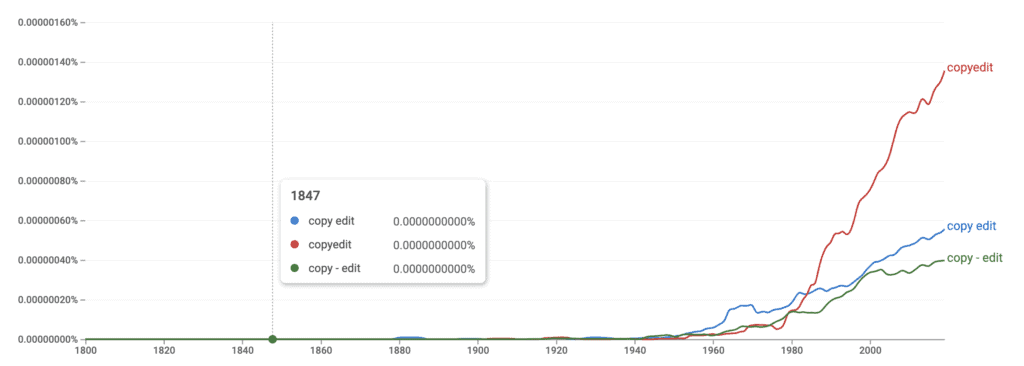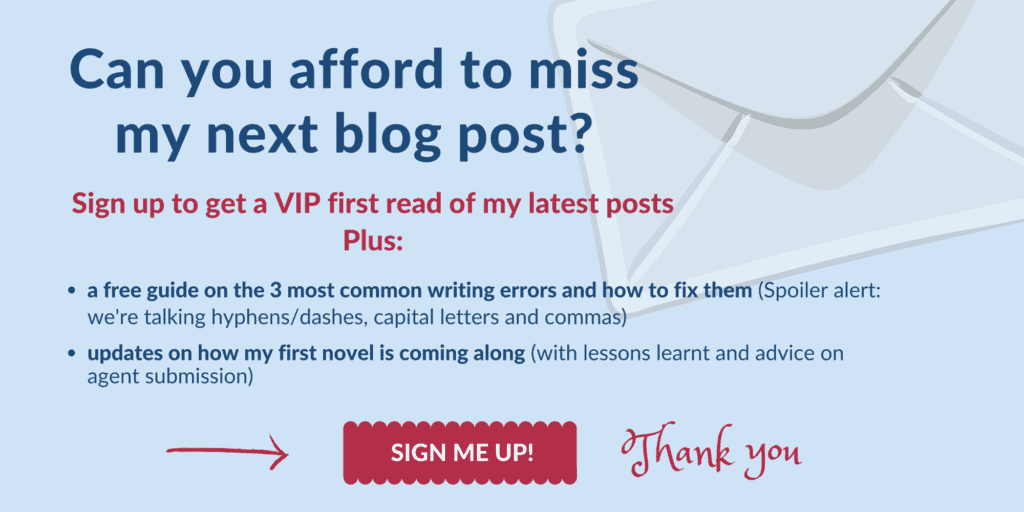
If you’re a copyeditor (copy editor, copy-editor) like me, there are three ways to write your job title. How do you choose the best one for you?
I recently posted a question on LinkedIn, asking fellow editors how they describe themselves: “How do you format the words “copyeditor”, “copyedit”, “copyediting” etc? One word? Two words? Hyphenated?”
I felt a bit of a fraud even asking. Being a professional editor involves the constant questioning of spelling, grammar and punctuation, and frequent referral to online and paper reference guides. However, surely I should be able to correctly write my job title without asking for advice?
Surely we editors should be able to correctly write our job titles without asking for advice? Copy-editor, copyeditor or copy editor. Which are you? Share on XIt turns out I needn’t have worried. Comments came thick and fast, and the only sure thing to come out of it was that there is no consensus regarding the formatting of ‘copyeditor/copy-editor/copy editor’.
While this knowledge is somewhat freeing, just how do you decide which one to go with? Hopefully this post will help you.
What’s the problem?
I could just pick one and run with it. Trouble is, I’m also a proofreader (one word, no one disputes that) and a line editor (two words, no one disputes that either). Hence the issue.
If I write on my website that “I am a line editor and a copyeditor”, it may be construed as an error. Potential clients may think, She’s missed out a space there. Her attention to detail isn’t great, is it?
If I write, “I am a copy editor and a proofreader,” they may think, She’s included a space where there shouldn’t be one.
And if I use a hyphen, it looks even odder (to my eye, at least): “I am a line editor, a copy-editor and a proofreader.”
To further add to the confusion, the verb can also be written ‘copyedit’, ‘copy edit’ or ‘copy-edit’, and just because one style guide advocates, say, ‘copy editor’, it doesn’t mean they also advise ‘copy edit’ as the verb. Heavens above!
Let’s run through the pros and cons of each form.
One word – copyeditor
Pros
- Used by:
- The Chicago Manual of Style (CMOS). Their copyeditors ‘copyedit’. A match!
- The American Heritage Dictionary of the English Language. Their copyeditors can either ‘copyedit’ or ‘copy-edit’.
- The Chartered Institute of Editing and Proofreading (CIEP). Their copyeditors ‘copyedit’. Another match!
- Over time, language tends to simplify. Two words become hyphenated; hyphenated forms become one word. The Google Ngram below seems to suggest this is the case with ‘copyeditor’.
- This option matches the format of ‘proofreader’ (one word).
- It also matches the most commonly used verb form, according to Google Ngram (the one-word ‘copyedit’).
- Other terms beginning with ‘copy’ are written as one word, such as ‘copyright’ and ‘copywriter’.
Cons
- An issue raised by a few people on LinkedIn was that using one word (copyeditor) meant they were often contacted to do copywriting as the two terms look similar at a glance. ‘Copywriting’ is written as one word in the industry, according to this article on Copify’s blog.
- It doesn’t match the format of ‘line editor’ (two words).
Two words – copy editor
Pros
- Used by:
- Merriam-Webster’s Collegiate Dictionary (11th Edition). Their copy editors ‘copyedit’.
- The Associated Press Stylebook (AP). Their copy editors ‘copy edit’. A match!
- Oxford English Dictionary (OED). Their copy editors ‘copy-edit’.
- The Guardian style guide. Their copy editors also ‘copy-edit’.
- It matches the format of ‘line editor’ (two words).
- It is the most popular form, according to Google Ngram.
Cons
- It doesn’t match the format of ‘proofreader’ (one word).
- The usage trend appears to be decreasing (see Google Ngram below).
- It doesn’t match the most popular verb form (the one-word ‘copyedit’).
Hyphenated – copy-editor
Pros
- Used by:
- Butcher’s Copy-editing: The Cambridge Handbook for Editors, Copy-editors and Proofreaders. Their copy-editors ‘copy-edit’.
- The New Oxford Dictionary for Writers and Editors. Their copy-editors also ‘copy-edit’.
- It’s a handy compromise if you aren’t keen on the polarised one- or two-word forms.
Cons
- It doesn’t match the format of either ‘line editor’ (two words) or ‘proofreader’ (one word).
- It is the least popular form (see Google Ngram below).

What is the overall online trend?
Language evolves over time. At any single point in time, there may be more than one correct way to spell or present a word, regardless of region or dialect. However, there is often a trend that can suggest which form may be more common in the future.
To help me decide which form of ‘copyeditor’ and ‘copyedit’ to use, I decided to look at where the term is heading, rather than where it currently sits. That way, I could be ahead of the curve and save time changing my website when the popularity swaps over, if at all.
This is where things get interesting. Google Books Ngram Viewer (one of my favourite tools!) shows that, in both American English and British English, ‘copy editor’ is the more popular form when compared to ‘copyeditor’. ‘Copy-editor’ with a hyphen doesn’t really get a look in. However, notice that the use of the two-word form is decreasing fairly sharply, whereas the one-word form is on the rise. When will they meet? Place your bets!

There is more clarity for the verb (bear in mind the Ngram results probably also include the use of ‘copyedit’ as a noun, as only the individual word is examined, not its context).

In conclusion, the trend appears to be favouring the one-word forms of both ‘copyeditor’ and ‘copyedit’.
What is my decision?
After much deliberation (far more than the situation probably warrants), I can announce that I am a copyeditor who copyedits.
After much deliberation, I can announce that I am a copyeditor who copyedits. Copy-editor, copyeditor or copy editor. Which are you? Share on XI’ve made this decision based on a few factors:
- The trend seems to be heading in that direction (despite the two-word form of ‘copy editor’ being currently more popular).
- I would rather my job title and what I do to match in form (as opposed to being a ‘copy editor’ who ‘copyedits’, for example, if I were to go with what is currently most popular).
- It looks neater as one word.
- I am a member of CIEP, and their house style is the one-word form (not that they dictate which form their members use).
Clearly, if you’re following a particular style guide for a client’s text, you need to adhere to their rules. However, if you’re making the decision for your business, choose whichever term and whichever combo you prefer. Whatever you choose, rest assured that you cannot make the wrong decision, as all options are correct in their own way. There aren’t many situations you can say that about!
The important thing is to be consistent. Once you’ve made your decision, stick with it and ensure that across your website, marketing activities and any publications you produce regarding your business, you use the same format. (Note to self: check website … I’m sure I currently have some inconsistencies!)
What form have you decided on and why? Let me know in the comments!
Further reading
Other editors have written on this topic. If you’d like to delve into other articles for a variety of views, take a look at these gems:
- Lars-Olof Nilsson’s Copy editor, copy-editor or copyeditor?
- Erin Wright’s Am I a copy editor or a copyeditor?
- Mignon Fogarty’s Is it “copy editor” or “copyeditor”?









Sally M. Chetwynd
This post is particularly useful to me, as I am currently moving into both copywriting and copyediting. I’m adhering to the CMS style – one word – a copyeditor who copyedits. Knowing that every option is equally acceptable gives me “ammunition” against any who chooses to argue the point.
Similarly, I’ve engaged in three discussions lately, with colleagues in a business networking community, about the use of the Oxford comma. They are all relieved to learn that they are not wrong, either way. I emphasize that as long as they are conveying clearly the meaning they intend to convey, that’s the way to use, or not use, the extra comma.
Debbie Emmitt
Hi Sally, glad to hear this post was of use to you! I felt the need to write it as I thought I was the only person questioning this, until I posted on LinkedIn and the thread went wild (well, as ‘wild’ as my posts tend to get!).
Re. the Oxford/serial comma, yes, this is a question of style. In general, most UK guides seem to not favour it, unless to clarify meaning (the obvious exception being The Oxford Style Guide), and most US guides favour it. However, as you say, neither is incorrect – it’s all about consistency and clarity.
Richard Arbib
Glad to have read this. I just had new business cards printed, created a website, and a LinkedIn profile. On all of them, what I listed was: Copywriting & Copyediting.
Debbie Emmitt
Nice!
Alexander St-John
The argument about what is (or isn’t) copious—falls into the argumentum-ad-populum fallacy. And, what is a “matching format” is also irrelevant since, really, hyphenation amounts to what is [more] legible. ‘Copy-edit’—as odd as it may seem (as a verb)—might only seem odd since the advent of ‘copy-pasting’.
Still, I’m positive that all this fuss (and limiting) lies in its posing a difficulty for non-humans, more so than how it affect us “real readers”(?).
For the human eye, it’s generally beneficial to hyphenate a compound adjective or noun with a set of three or more words, for instance.
Personally, I find the pronoun ‘no-one’ to be more clear than ‘no one’. This might have to do with a spectrum of dyslexia (creeping in the masses). Hyphens aside, a big issue is overgeneralisation (such as ‘everyday’ when it isn’t an adjective).
disclaimer: The above is not criticism, but merely discussion.
Dave Williams
Interesting. I work in-house at a marketing agency and my job title is currently ‘Proof Reader’ [yup].
I have a colleague whose job title is currently ‘Copy Editor and Proof Reader’ [yup].
Since more of my day-to-day work involves copy documents than proofs, I advocated to my line manager for getting my title updated to match.
But I was also acutely aware of the evolution-of-compound-nouns thing and how irritatingly applicable it is to the words for these particular jobs: hence the Google-search that led me to your article!
I’m waiting to discuss it with my colleage to see what she thinks, but despite most of my reference books still hyphenating ‘copy-editor’, I’m definitely leaning towards closing it up to match ‘proofreader’…
Debbie Emmitt
It’s ironic, isn’t it, given what we do, that there is so much discussion over the formatting/punctuation of our job titles!